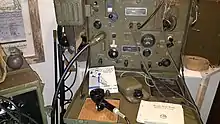The SCR-284 was a World War II era combination transmitter and receiver used in vehicles or fixed ground stations.[1]



History
The Crosley Corporation of Cincinnati, Ohio manufactured the Signal Corps Radio set SCR-284 that consisted of the BC-654 and associated support equipment.[4]
The SCR-284 was introduced in Africa during Operation Torch and was the first radio set used for communications from the beach to the U.S. Fleet to coordinate naval gunfire and beach radio networks.[5]
The set was used by Merrill's Marauders while operating in the China-Burma-India Theater and missions behind Japanese lines in Burma to communicate with air transport and other military aircraft, although some radiomen complained that it was "very inefficient" compared to other radio sets and "very hard to generate power".[6][7]
The SCR-284 saw use in the Guadalcanal Campaign for portable operation with a hand crank generator. Transport over rough roads by Jeep tended to damage it, so it was disassembled and carried by several men.[8]
The SCR-284 was also used in the New Georgia Campaign, but was so heavy and prone to humidity damage it was sometimes left behind.[9]
More than 50,000 SCR-284s were produced and delivered in support of Operation Overlord, the D-Day invasion of Normandy. The complete SCR-284 transmitter, receiver, power unit and accessories weighed more than 100 pounds, but could be divided into sections for transport. The 45 pound BC-654 transmitter was notably difficult for radiomen to carry during combat, and has been described as "roughly the weight, size and shape of a modern window air conditioner".[10]
63972 units were eventually produced in total.[11] After the war, many BC-654s were sold as surplus for $15 each. Today, many are restored and operated by vintage amateur radio enthusiasts.[12]
Configurations
- Field Radio Set - World War II era. Battery powered receiver, hand crank generator powered transmitter.
- Vehicular Radio Set - World War II era. 6/12 V dynamotor power, vibrator supply.
- Command Radio Set - Korean War era. two-cycle 3600 RPM, 1 horsepower gas generator power.
Technical description
- Technical Manual TM 11-275, final edition dated 14 January 1944 with Supplements dated 11 February 1944 and 5 April 1945.
- Frequency Range: continuous, 3800 to 5800 kHz
- Modes: AM voice, CW (Morse code), MCW
- Receiver Type: Single conversion superheterodyne receiver
- IF Frequency: 455 kHz
- Dimensions: 18" × 14" × 93⁄4" (BC-654 only)
- Weight: 44.75 lb (20.3 kg) (BC-654 only)
Performance specifications
- Transmitter output
- AM: 17 watts
- CW: 24 watts
- Receiver Sensitivity: TBS
In popular culture
- In the TV show The Munsters, Grandpa Munster was depicted using a BC-654 as part of his amateur radio station.[13]
See also
References
- ↑ Fucci, Antonio. "Radio Set BC-654-A SCR-284-A Receiver and Transmitter".
- ↑ [./Http://dodgem37.com/radio-set-scr-284/ Reinemann, Carl. "Radio Set BC-654-A SCR-284-A Receiver and Transmitter".
- ↑ http://dodgem37.com/radio-set-scr-284/ Reinemann, Carl. "Radio Set BC-654-A SCR-284-A Receiver and Transmitter".
- ↑ Madison, James H. (December 1992). "Discovering America: A Special Issue". Journal of American History. 79 (3): 1102–1106. doi:10.2307/2080804. ISSN 0021-8723. Retrieved 15 November 2006.
- ↑ The American GI in Europe in World War II: The March to D-Day. Stackpole Books; 22 September 2009. ISBN 978-0-8117-4373-0. p. 51–.
- ↑ Gavin Mortimer. Merrill's Marauders: The Untold Story of Unit Galahad and the Toughest Special Forces Mission of World War II. MBI Publishing Company; 15 November 2013. ISBN 978-1-61058-902-4. p. 32–.
- ↑ DIANE Publishing Company. Merrill's Marauders: February to May, 1944. DIANE Publishing; 1 January 1990. ISBN 978-0-7881-3275-9. p. 29–.
- ↑ Samuel Milner. United States Army In WWII - The Pacific - Guadalcanal: The First Offensive: [Illustrated Edition]. Verdun Press; 15 August 2014. ISBN 978-1-78289-399-8. p. 381–.
- ↑ John R. Walker. Bracketing the Enemy: Forward Observers in World War II. University of Oklahoma Press; 8 August 2013. ISBN 978-0-8061-5032-1. p. 209–.
- ↑ John C. McManus. The Dead and Those about to Die: D-Day - The Big Red One at Omaha Beach. Penguin Publishing Group; 5 May 2015. ISBN 978-0-451-41530-1. p. 135–.
- ↑ The United States Army In WW II, Volume on Statistics, Section on Procurement, 09 APRIL 1952, Page 60.
- ↑ "Newsletter, June 6, 1994". The Mississippi Historical Radio and Broadcasting Society. MHRBS. Retrieved 2 May 2017.
- ↑ "Ham Radio On TV" (PDF). Key Clix. Amateur Radio Club of Savannah. May 2007. Archived from the original (PDF) on 5 June 2011. Retrieved 2 May 2017.
External links
General references
- TM-11-275 — Technical Manual And Operating Instructions For The SCR-284-A Radio Set (BC-654-A Radio Receiver And Transmitter)